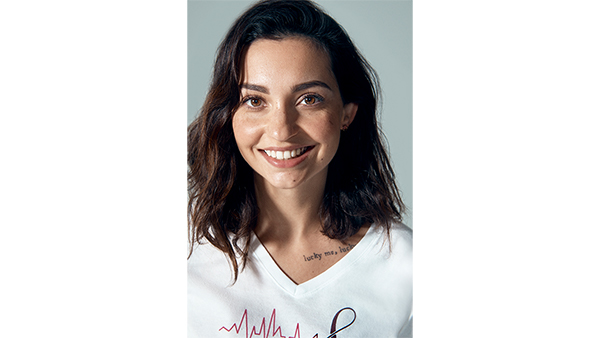Sam was 26 when she was diagnosed with stage III triple negative breast cancer. She went through six rounds of chemo, 28 rounds of radiation, and a double mastectomy. It’s been three years since she’s been in remission. As an upside down enthusiast, Sam has found much of her healing in a yoga practice. Today she is most passionate about connecting with the breast cancer community and sharing the misconceptions about survivorship.
We had the chance to talk with Sam. We’re honored to share her words of wisdom.
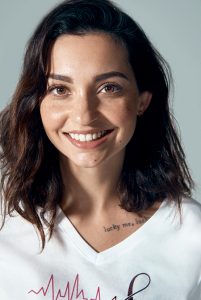 On Being an Anesthesiologist:
On Being an Anesthesiologist:
I originally wanted to be a psychiatrist but took a detour. I stumbled on Anesthesiology by accident and I fell in love with it. I have these really brief but intimate relationships with my patients. I’m taking care of them moment to moment. And I can make immediate changes to their blood pressure, their heart rates; there is complete control. There are a lot of procedures and manual skills, so I work with my hands and my brain at the same time.
On Patient Care:
We meet our patients for the first time the day of their surgery. We have 30 seconds to come in, gain their trust and make them feel safe. It’s important to look at their medical history quickly and thoroughly. We examine them and make sure they are safe to undergo their procedure. We’re pretty much the last barrier from a patient being able to have a procedure, so we’re kind of the final checkpoint before takeoff.
On the Reality of Television:
I’ve never yelled over a curtain, ‘We’re losing him!’ That’s not a thing that anyone ever says. If I am having a hard time, I will discuss with the surgeon, but it’s always in a disturbingly matter-of-fact way when things are going badly.
On Advice to Your Younger Self:
I would tell her that nobody really knows what they are doing. We’re all actually totally winging it. And even the people who seem like they have it under control and together, sometimes they are winging it too. Eventually you just wing it enough times that you start to get pretty good at it.
On Medical School:
It’s all-consuming. You can have one hobby in med school and you can do it like one day a week. You do 4 years. We like to refer to the first two as drinking from a fire house (in the way that information is given to you) and once you are done with that trauma, you get to experience a different type of trauma where they put you in contact with patients and people yell at you a lot.
On Diagnosis:
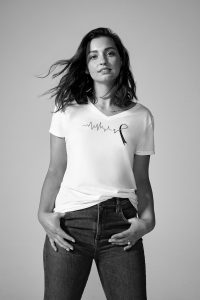
It wasn’t a huge surprise to me actually. I had this very large lump that I was ignoring for multiple months because I was too busy to deal with it. I had such a large tumor that by the time I presented to our employee health physician (not to knock doctors that do this kind of job, but she sees a lot of sniffles and ankle sprains) she was like, ‘here’s a prescription for an ultrasound’ and because I was already at work, she marched me across the street immediately to the radiology department.
I meet with the radiologist who is very quickly saying to me, ‘Well, we’re going to see what the biopsy shows, but if this is cancer you won’t be the first twenty-six year old and you won’t be the last. “
Not the first and not the last? So excuse me, this could actually be happening to me? After that and a lot of googling, I was pretty much convinced. By the time I got the biopsy results over a very long labor day weekend, all I had to do was walk into the room and I watched the way her face fell and I was like, ok, you don’t need to say anything else, I’ve got it.
My first thought was, Can I have breast cancer and not tell anyone about it? Because it wasn’t even going through it myself that scared me, it was having to deal with managing everyone’s expectations and keeping everybody positive and hopeful because the diagnosis was not favorable. I was stage III triple negative, which if you know anything about the breast cancer world, it’s not a great type to have.
Can I have breast cancer and not tell anyone about it?
It was something I had to learn on this journey, that people really do want to be there for you. Your husband might prefer you to be more active and healthy, but there is nowhere he’d rather be than hanging on the couch watching Netflix with you and your passed out, chemo-sick self.
On Knowing Cancer Personally & Professionally:
It’s very strange being on both sides because you can see the gears turning in their [doctors] heads the way they turn in my head when I have to deliver bad news to a patient. Or when I’m trying to build that rapport and gain that trust.
It makes you wonder how patients actually feel. Sometimes I would hear the way that I had practiced myself – part of med school is rehearsing the delivery of bad news, and when it’s done well, it’s done well. But when you know what it’s like behind the scenes, you wonder how genuine it is. Are you really sad? And if they are sad, you’re kind of like, Don’t be sad. I don’t need you to be sad. I need you to be my doctor.
Don’t be sad. I don’t need you to be sad. I need you to be my doctor.
I think the answer that everyone expects is that it makes us so much more empathetic and able to connect. And it does! But at the same time, I tried that approach. I tried saying, ‘I really do know what you’re going through. No, actually I do!’ My patients didn’t want to know that I had breast cancer. They did not want me to be in the shit with them. They wanted me to be an authority figure; the guide.
On Treatment:
It was hard on my body. Obviously, I lost all of my hair, but I found out that I was neutropenic. I found out after I had been cleaning out wounds of patients. It was physically challenging. I continued to work during my intern year of residency. 80 hour weeks, 6 days a week. I was pretty much a shell of a person. It was like showing up to work hungover, but for 6 months straight.
It was like showing up to work hungover, but for 6 months straight.
I wasn’t trying to be strong or brave by doing this. I just figured it would be better if I could put all of these bad parts in my life and compress them into one bad part. Intern year isn’t fun for anyone, even if you are perfectly healthy, and chemo is, well, chemo. So I was like, I don’t want to beat cancer and then have to go back to do my intern year… So I had to go to work, come home, flop on the couch, do it all over again. I definitely wasn’t living any kind of life, I was just existing for a while.
On Life After Cancer:
I had a double mastectomy because in the process, I found out I have the BRCA1 mutation which made a lot of sense as to why I got breast cancer at 26. It’s not a great diagnosis to get because it puts you at risk for a lot of other cancers as well, but it kind of helped me make sense of the whole thing, instead of just being a giant middle finger from the universe.
I walked around with drains for a little under two weeks, which is the worst. Things hanging out of you and draining bloody fluid from you; it’s not a good look. My doctor put in what are called tissue expanders, so every week it was like a new puberty where she would stick more saline into my fake breasts and they would get gradually bigger.
And then I had radiation with the expanders in place. That was 28 rounds, 5 days a week. Radiation was physically easier but mentally exhausting because you had to be there every day even though you were so ready to be done with all of the cancer stuff, and yet you still had to come back to this place every day and lay on the table and get shot up with radioactive particles.
On Survivorship:
If you are lucky enough to make it through to the other side, and if you ring your bell and they declare you cancer free and walk out of there and instead of feeling grateful and happy, you feel sad and scared and lost, just know that that actually happens to all of us.
There are a lot of misconceptions about what ‘survivorship’ is like. After losing that sense of safety and the feeling that you had plenty of time in life, when they tell you that you can go home, you might find your trust in that has been shaken. You’ll probably need some therapy. And that’s okay, we all need therapy. Even if you haven’t had cancer, you probably need therapy.
Even if you haven’t had cancer, you probably need therapy.
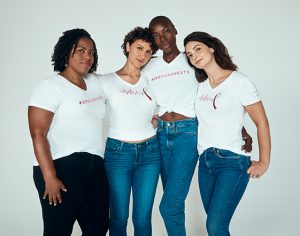 On The Breasties:
On The Breasties:
The Breasties was pretty new when I first found them. I found them through social media. Finally, they were having a meet up somewhere pretty close to where I lived.
I took a couple laps around the block. I was about to walk into a room full of strangers and talk about the worst thing that ever happened to me.
Once I walked in, it was the best experience. Everybody in that room had some similar kind of journey. Even if they were previvors, they had lost their mothers or were otherwise intimately familiar with cancer. I had been in a pretty rough place dealing with the aftermath and survivorship. After meeting all of these women, felt kind of light again for the first time in a while.
On Self-Advocacy:
I think the advice I would give someone is to get a lot of opinions on your care. Not too many, but 2 maybe 3 solid perspectives on what you should do. And if there are questions in your treatment, ‘Should I do this?’ or ‘Should I do that?’ It’s obviously very personal, but err on the side of doing more. You will never regret doing more to save your own life.
On Community:
You really need to find a group of people who understand. As much as your family and your friends can be your rock and they can be there for you, there is nothing that compares to someone who looks at you and goes, ‘I know exactly how you feel.’ Because they actually, truly do.
There is nothing that compares to someone who looks at you and goes, ‘I know exactly how you feel.’ Because they actually, truly do.
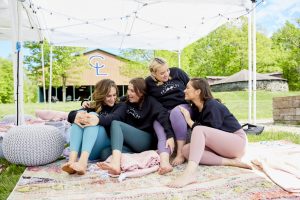
Visit here to wear your support for Sam and The Breasties. 20% of the proceeds will be donated to support their mission.

